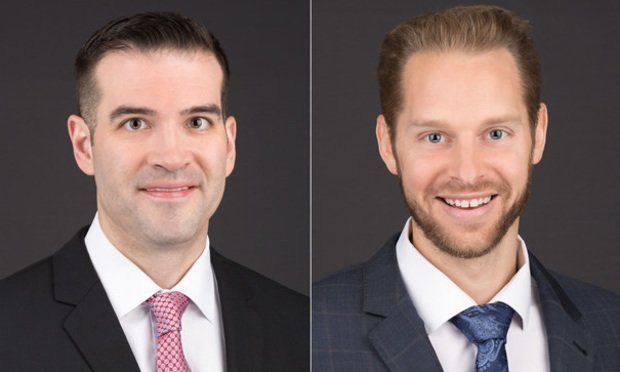Client Advocacy Beyond Courtroom Helps to Deliver Real Change
In March 2019 the U.S. Food and Drug Administration issued a statement from Commissioner Scott Gottlieb and Jeff Shuren, its director of the Center for Devices and Radiological Health, on the evaluation of materials in medical devices to address potential safety issues. It was an important step in improving medical device safety.
It also reflected the role that a lawsuit plays in advancing patient benefits beyond the courtroom.
The statement directly addressed the intrauterine contraceptive device, Essure, which has been blamed for a host of adverse patient reactions. With patients taking the lead on this critical matter, as their attorneys and advocates, together we helped encourage the FDA to help improve how this and other products are brought to or remain on the market.

L-R Justin Parafinczuk and Marcus Susen, Koch Parafinczuk Wolf Susen, Fort Lauderdale.
FDA Statement on Nitinol
First, about the commissioner’s and director’s recent statement. The statement, in part, directly addressed the use of “Nitinol in devices.” Nitinol is a nickel-titanium alloy that provides greater shape memory and elasticity than other similar products. It can be highly effective when used in medical devices.
But like many foreign bodies, it can lead to inflammation, allergic reactions and other unintended, even fatal consequences when inserted in people. In the case of Essure, women reported hair and tooth loss, excessive bleeding, persistent pelvic pain, perforated organs, hysterectomies, even deaths.
The statement addressed how, in December 2018, the FDA announced a “revised protocol for the postmarket surveillance study” specific to the Essure device. The protocol sought to “better understand how the materials in the device interact with the body’s immune system.” In working with Bayer, Essure’s manufacturer, the FDA wanted to ensure “the company implemented several approved modifications to the study that we believe will strengthen the evidence collected.”
The revisions required significant changes to study protocols. Women in the study now will be followed for five years; three years were initially required. “This extension will provide us with longer-term information on adverse risks of the device, including issues that may lead women to have the device removed.”
Garnering such a response from the FDA was no small feat. The original manufacturer, Conceptus, Inc., in 2002 had won conditional premarket approval (CPMA) by the U.S. Food and Drug Administration. This means the FDA relied on Conceptus’ own research in granting approval to release the product to market. Even when women worldwide began reporting adverse health symptoms and outcomes, the FDA’s CPMA offered broad federal immunity from liability for Bayer Essure Inc., and Bayer Healthcare Pharmaceuticals, Inc.
Our law firm has been at the forefront of the litigation surrounding Essure. We filed the first lawsuit after overcoming the device’s premarket approval.
But that was only one step in our advocacy. We became more intimately involved in the Essure matter after learning via social media the impacts it was having. As far back as 2013, women nationally were going beyond submitting the required “adverse event reports” posting of symptoms they were suffering after having Essure inserted. As of last year, more than 18,000 such reports had been filed.
Social media sites and Facebook groups, including the Essure Problems Facebook page, were being formed.
This was no niche population. Through their research and other findings, it became clear that more than 20 percent of people are allergic to nickel, a key component within Essure.
It was clear that a lawsuit might result in plaintiff damage awards. Without our clients mobilizing, it is likely that Essure would still be sold today. Instead, the results have been remarkable. The first complaints began surfacing in 2013. Less than six years later, the FDA was demanding substantial actions. Following the meeting with Gottlieb, the FDA required that Essure packaging carry a “black box warning” about potentially serious side effects.
Now, the FDA has revised the research protocols to take a harder look at some of the devices and elements inserted and implanted into patients’ bodies.
It can be difficult to get a federal agency to act in an expedited manner. The FDA’s March statement reflects the importance the agency has placed on the Essure issue. This rare level of responsiveness is what affected women across the country have been pressing for from the start.
The involvement of our clients, their families and others in aggressively advocating for this change cannot be over-emphasized either. Ultimately, advocacy in the halls of government and the courtroom delivered real change that will positively impact millions of women.
Justin Parafinczuk, a partner at Parafinczuk Wolf Susen, is a board certified civil trial attorney and the discovery chair of the plaintiffs steering committee for Essure.
Marcus Susen, also a partner with the firm, is a board certified civil trial attorney and lead counsel of the plaintiffs steering committee. For more information, visit www.PWSLawFirm.com.
Source: https://susenlawgroup.com/wp-content/uploads/2020/11/5-1-2019-Yahoo.pdf
https://finance.yahoo.com/news/client-advocacy-beyond-courtroom-helps-102821152.html


